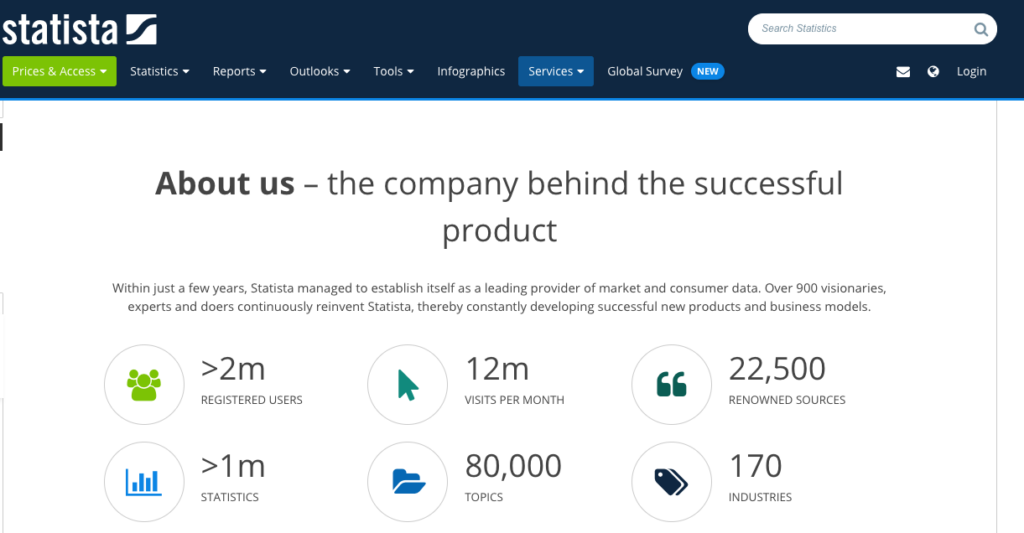“This is our business model” is not a defense

Companies engaged in questionable or unethical practices will often defend them by saying, “This is our business model.” But building a business on bad behavior does not make it right.
This came up after my criticism of Statista’s research practices yesterday. The company responded in a pair of tweets:
I am not disputing that Statista has hundreds of employees working to present the data it has aggregated. But I was was particularly interested in their statement, “We stand by our business model.” Despite the link, the company’s About page doesn’t describe the business model, beyond “a leading provider of market and consumer data” and a video that explains how it helps researchers.
So what is the business model?
Statista “consolidates statistical data on over 80,000 topics from more than 22,500 sources.” It’s not clear what licenses are involved, but with such a large number of sources, it’s likely that many of these data providers are not compensated, with Statista showing the data through copyright fair use with a link. In other cases, the source providers may have a relationship with the company.
The business model is aggregating data and selling the aggregation, along with custom research services, data visualization/information design, with a frosting of some original research.
Why would you have to “stand by” such a business model? Obviously, because some people have a problem with it.
Because they sell subscriptions to aggregated data, they need a steady supply of leads that will potentially become customers. The obvious way to get them is to do is content marketing with all that content. And that is just what Statista does so well — it makes content available so it will appear in searches. But in some cases, that means eliminating the links to the original sources of the data when you are outside the paywall, because they don’t want to send you away to find your answer, they want you to become annoyed enough to become a paying subscriber.
Is this business model a defense for violating the norm of always listing the source for data?
No.
A business model is never a defense. “We make money doing it this way” has no bearing on whether what you are doing is the right thing to do.
Business disruption and platforms are based on violating rules and norms
Consider some other companies that might justify their business practices based on “This is our business model.”
According to Nicholas Kristof in the New York Times, Pornhub allows people to upload videos without sufficient proof that the participants are at least 18 years old, as the law requires. The result is plenty of rape and child porn on the platform. Is this wrong? Well, allowing people to easily upload and share video is how the platform makes money. In other words, “This is our business model.”
Uber treats its drivers as independent contracts, despite a level of control that would be more appropriate for employees. But the cost of having drivers as employees — including paying them a minimum wage and providing workers’ compensation — would render Uber’s business nonviable. Keeping them contractors is how the platform can profit (or at least, not lose as much money). In other words, “This is our business model.”
Amazon allows third-party sellers to sell things on its platform. Some of these sellers are scammers. But as Amazon is a platform, it is inefficient for it to vet every seller thoroughly. The cost of such vetting would interfere with the profit in this channel. In other words, “This is our business model.”
Notice what all these examples have in common: aggregation. Statista is aggregating stats, Pornhub is aggregating porn, Uber is aggregating drivers, and Amazon aggregating sellers and items to be sold. Every platform creates efficiency by aggregation. Google is aggregating searches and answers, Airbnb is aggregating places to stay, Facebook is aggregating your friends and their experiences, Instagram is aggregating pictures, and Yelp is aggregating reviews.
When a company falls back on “This is our business model,” it is saying, “Our profit comes from cutting corners, violating norms, and getting in front of you to represent the entities whose content and services you’ll actually use.” In every such situation, the profit arises from collecting as large a collection as possible of whatever the platform is aggregating, keeping you on the platform, and removing as much cost as possible.
Humans who vet things are cost. People who leave the platform are cost. So these companies’ business model is based on violating norms, customs, and laws to reduce those costs. This means spending as little as possible on vetting things, and reducing as much friction as possible.
Is this evil? Generally, no (although in the case of Pornhub, I might make an exception). It’s not evil, it’s just business. But making money is not an excuse for breaking rules. That’s why “This is our business model” is never a defense for how a company has decided to behave.
Statista reminds me of eMarketer, which would routinely aggregate other organizations’ research data without seeking their permission or compensating them. You also have to wonder about an organization that admits only 50% of its data are original and proprietary.
Such an interesting topic. So worthwhile exploring.
Very interesting perspective, casting a new light (for me at least) on the pitfalls of aggregation without 99% vetting.
“Notice what all these examples have in common: aggregation. ”
Great post –– reminds me of Ben Thompson’s ongoing Aggregation Theory series, which unpacks some of the implications in greater detail: https://stratechery.com/concept/aggregation-theory/